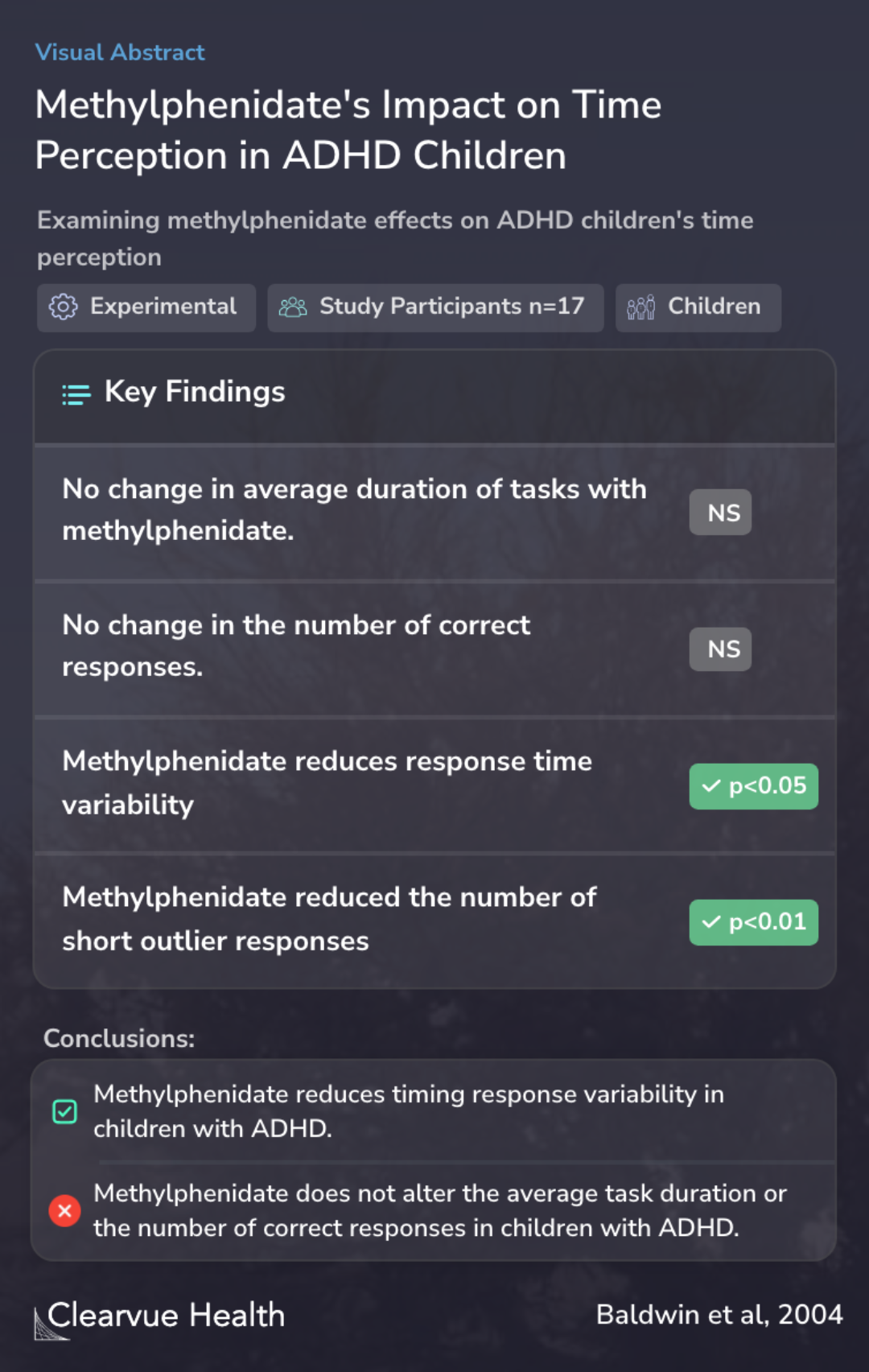Effect of methylphenidate on time perception in children with attention-deficit/hyperactivity disorder
Methylphenidate's Impact on Time Perception in ADHD Children
Baldwin RL, Chelonis JJ, Flake RA, Edwards MC, Feild CR, Meaux JB, Paule MG

Objectives
The study focused on exploring the effects of methylphenidate (MPH), commonly known as Ritalin, on children with attention-deficit/hyperactivity disorder (ADHD) performing a time-production task. The task required the participants to hold a response lever down for a specific duration. The main objective was to observe how MPH influences the accuracy and consistency of their responses in terms of timing.
The effects of methylphenidate (MPH) on performance of a time-production task were studied in 17 children with attention-deficit/hyperactivity disorder who participated in 1 test session on and 1 off MPH. Participants held a response lever down for at least 10 but no longer than 14 s. Ad...
Methods
In this experimental setup, 17 children diagnosed with ADHD participated in two sessions of a time-production task, one with and one without MPH administration. The task involved holding a lever for a duration of 10 to 14 seconds. The researchers aimed to assess the impact of MPH on various aspects of the task performance: the number of correct responses, the average duration of lever holds, the variability in timing responses, and the frequency of lever holds of different durations.
Participants held a response lever down for at least 10 but no longer than 14 s during a time-production task. They were tested in 1 session on and 1 off methylphenidate (MPH). The effects of MPH administration on the performance of the task were measured by analyzing the number of corre...
Results
The results showed that MPH administration did not change the number of correct responses or the average duration of the lever holds. However, a significant decrease in timing response variability was observed. This indicates that while MPH did not improve the accuracy of the task performance, it did lead to more consistent timing in the children's responses, reducing the number of extremely short lever holds and increasing holds of 10- to 11-second duration.
Administration of MPH had no effect on the number of correct responses or on the mean duration of lever holds. However, it significantly decreased timing response variability, increased holds of 10- to 11-s duration, and decreased lever holds of extremely short durations.
Conclusions
The study concludes that MPH administration in children with ADHD leads to a reduction in timing response variability, indicating an improvement in their ability to maintain consistent response times. This finding suggests that while MPH may not enhance the overall accuracy of task performance, it can help children with ADHD apply strategies more consistently in problem-solving situations.
The results suggest that administration of MPH in children with attention-deficit/hyperactivity disorder improves their timing performance without altering the average duration of lever holds, indicating a potential enhancement in working memory.
Key Takeaways
Context
Barkley et al.'s 1997 study delved into how ADHD affects children's ability to perceive and reproduce time intervals, questioning whether stimulant medication influences this aspect. They found that children with ADHD were less accurate in reproducing time, especially under distraction, and that medication did not improve this accuracy. This research aligns with the current study's findings, highlighting the challenges in improving time perception accuracy in children with ADHD through medication.
Similarly, Epstein et al.'s 2011 study investigated the impact of ADHD on response time variability across various cognitive tasks. Their findings indicated that children with ADHD exhibited a wider range of response times, reinforcing the idea that response time variability is a key characteristic of ADHD. This corroborates the current study's results, where MPH was shown to reduce response time variability, suggesting a potential therapeutic focus for ADHD treatment strategies.